The crypto market is evolving, and stablecoin liquidity is essential for institutions, hedge funds and exchanges in crypto markets. Best Stablecoin Liquidity Providers (OTC) allow exchanges to perform large trades with little market impact, priced given market conditions, and settled quickly.
Best Providers combine trading technology with operational market expertise and infrastructure to service clients with USDC, USDT and other major stablecoins (tokens). Trading with, and having capital with, liquidity providers of a volatility pencil enhances trade and asset protections during market turmoil.
Key Point
| Company/Platform | Key Point |
|---|---|
| Cumberland | Leading OTC crypto liquidity provider specializing in institutional trading. |
| GSR Markets | Offers high-frequency trading and algorithmic crypto market-making solutions. |
| B2C2 | Provides deep liquidity and OTC crypto trading services to institutional clients. |
| Galaxy Digital Trading | Institutional crypto trading arm of Galaxy Digital, focusing on liquidity and risk management. |
| Wintermute | Global crypto market maker offering OTC and liquidity services across multiple assets. |
| Amber Group | Offers crypto trading, liquidity provision, and OTC services for institutions. |
| DWF Labs | Specializes in decentralized finance (DeFi) market-making and OTC liquidity. |
| Jump Trading | Proprietary trading firm providing crypto market-making and OTC execution. |
| Kraken OTC | Institutional OTC desk from Kraken, enabling large crypto trades with minimal market impact. |
| Bitstamp OTC | Bitstamp’s OTC desk provides high-volume crypto trading with competitive pricing. |
1. Cumberland (DRW)
Cumberland, the crypto portion of DRW, is one of the most reliable and longstanding OTC desks. Since 2014, it has been providing significant liquidity in stablecoins such as USDT, USDC, and EURS, allowing organizations to perform large volume block trades with little slippage.
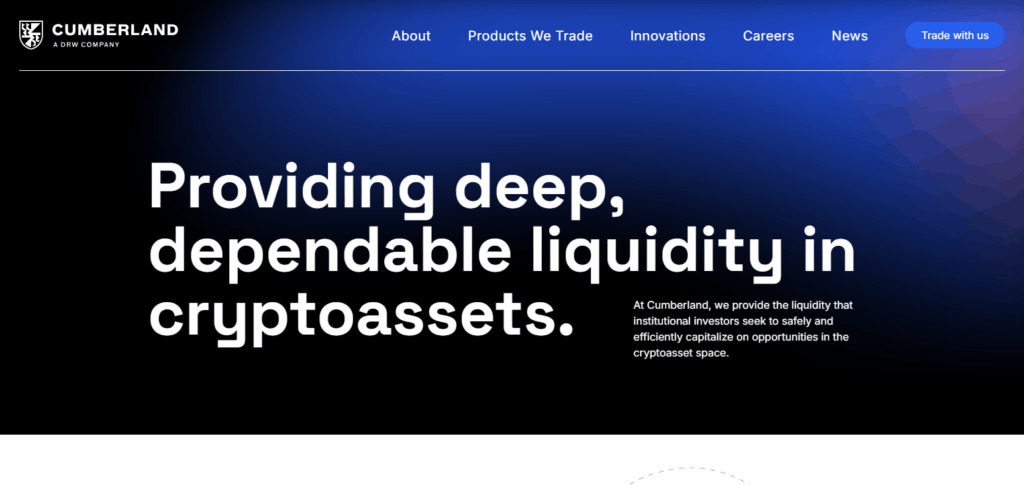
Cumberland has voice, chat, API, and web execution facilities, making it suitable to hedge funds and asset managers. With multi-fiat settlement (USD, EUR, GBP, JPY) and substantial market making, Cumberland is regarded as one of the best OTC stablecoin liquidity providers for organizations looking to reliability and capital efficiency.
Cumberland (DRW) Pros & Cons
Pros:
- Has an established OTC desk that has garnered considerable trust from the clients.
- Adequate liquidity across stablecoins (USDT, USDC, EURS).
- Has a lot of options in terms of multi-fiat settlements (USD, EUR, GBP, JPY).
- Has a number of advanced execution options (voice, chat, API, web).
Cons:
- Has an institutional focus, therefore, does not cover retail.
- Slower settlement times depend entirely on the fiat.
- No on-chain transparency makes it more limited than on-chain liquidity providers.
- Has a higher minimum trade size requirement.
2. GSR Markets
Crypto trading GSR Markets is one of the key players in the convergence of traditional finance and crypto. With the Systematic OTC platform, GSR supports 200+ digital assets and 25+ fiat currencies allowing stablecoin trading pairs with high liquidity.
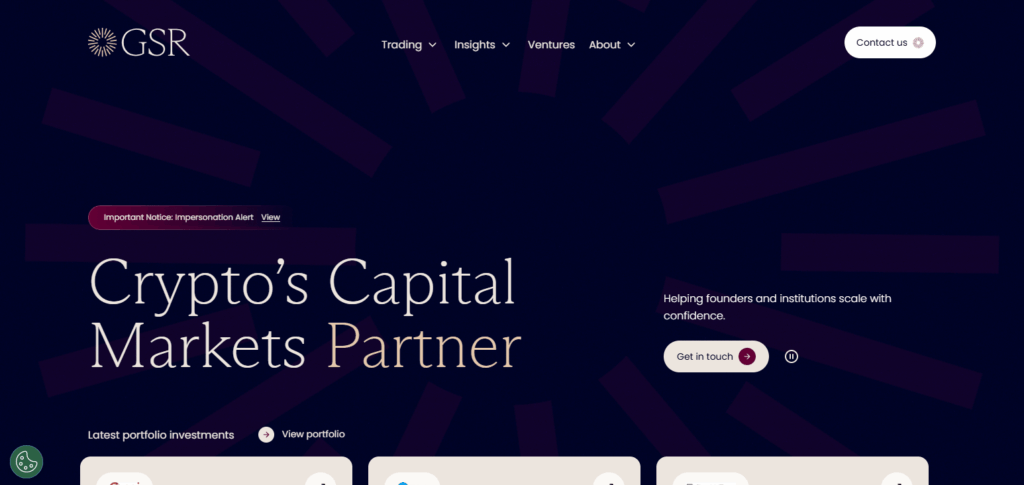
GSR’s implementation of the FX-native infrastructure ensures quick settlement and optimal spread for clients. Coupled with its privileged access to a global trading network, GSR ensures competitive pricing and high liquidity in the market.
In providing the best OTC services, particularly in crypto-to-fiat and fiat-to-fiat stablecoin conversions, GSR is unmatched in providing institutional caliber conversion services.
GSR Markets Pros & Cons
Pros:
- Has a strong FX-native infrastructure that allows for easier crypto-to-fiat conversions.
- Covers an expanse of 200+ digital and 25 fiat currencies.
- Tight spreads through the use of proprietary algorithms.
- Equipped with institutional-level risk management tools.
Cons:
- Has a complex platform that may be too much for smaller clients.
- Focus is largely on high-volume trades.
- Lack of transparency for retail markets.
- Settlement speed is dependent on the counterparty.
3. B2C2
As the first ever electronic OTC liquidity provider, B2C2 has built a reputation in the crypto space for providing round the clock execution and settlement in the major crypto assets and stablecoins.
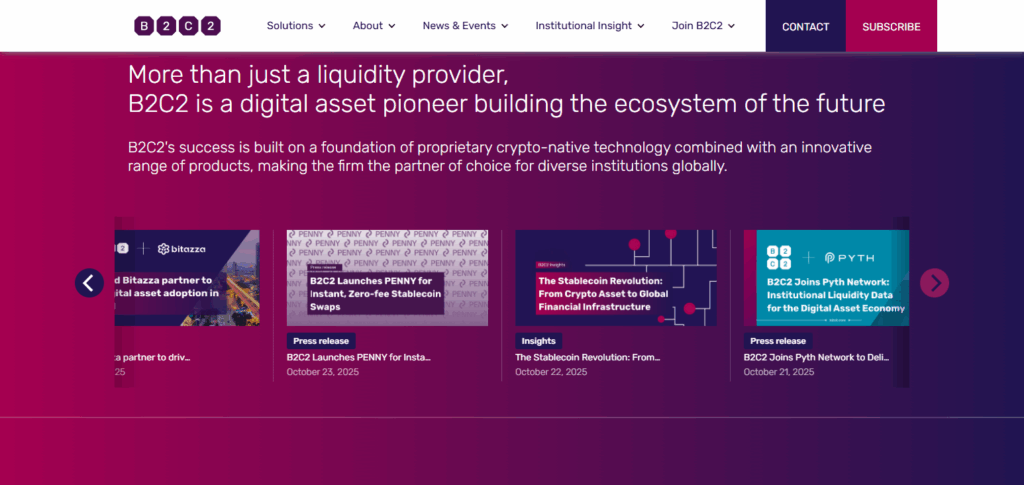
Their strong liquidity, coupled with no-fee stablecoin swaps, has built B2C2 an excellent reputation in the market, particularly for hedge fund brokers and exchanges utilizing B2C2 for their top rated OTC desk stablecoin liquidity.
With offices in the US, UK, Japan, and Singapore, B2C2 has a robust presence globally and is one of the top OTC desks for stablecoin liquidity for high-frequency and algorithmic traders.
B2C2 Pros & Cons
Pros:
- Early leader in the market with electronic OTC liquidity.
- 24/7 execution and settlement of any of the stablecoins.
- Worldwide coverage (UK, US, Japan, Singapore).
- Offers dependable pricing and no fee stablecoin conversions.
Cons:
- Might be asking for larger minimum trade sizes.
- Flexibility is limited and reliant on proprietary technology.
- Risks are associated to institutions with global presence.
4. Galaxy Digital Trading
Galaxy has built a reputation in the market for the full service institutional trading desk with OTC stablecoin liquidity, derivatives, and lending services. With Galaxy, large institutional clients in particular, hedge funds, and corporates, who require advanced risk management, are best served with Galaxy’s customized products such as swaps, options, and forwards.
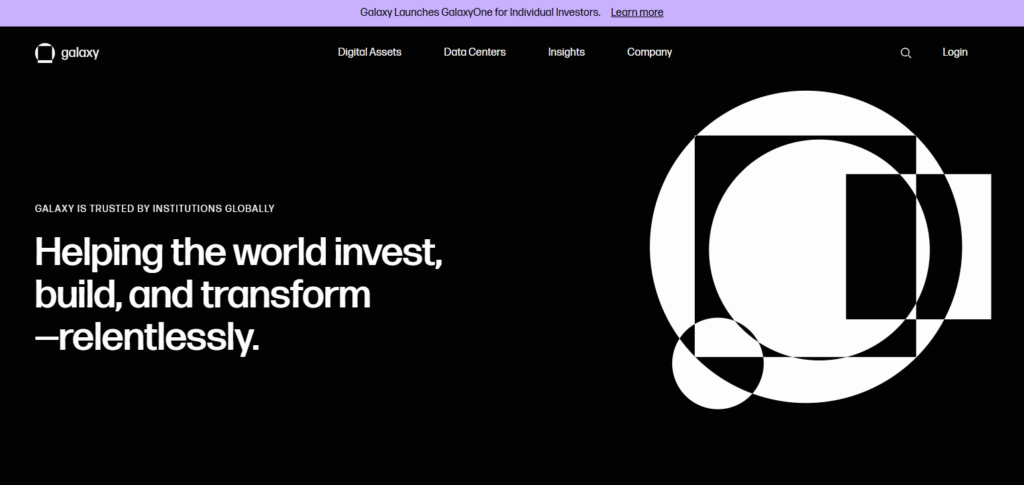
Utilizing on-chain liquidity like Morpho for borrowing stablecoins and for collateralizing with BTC/ETH, Galaxy has built an efficient and transparent service. For institutions with trading and financing services, Galaxy is one of the top OTC providers with a reputation for 24/7 stablecoin liquidity.
Galaxy Digital Trading Pros & Cons
Pros
- Derivative trading, Over-the-Counter trading, and lending provision.
- Tools for risk management are fully customizable (swaps, options, forwards).
- Over collateralization and other management improves Defi collateralization.
- Deemed as one of the best in the field.
Cons
- Due to client complexity, assets do not suit smaller clients.
- Are one of the most expensive providers of liquidity.
- Participates in the crypto industry.
- Includes volatility of the crypto industry.
5. Wintermute
In providing deep stablecoin liquidity Wintermute, an algorithmic market maker, enables efficient trading in both centralized and decentralized finance. With proprietary execution and pricing, Wintermute’s OTC platform, NODE, facilitates trading for over 250 crypto assets.
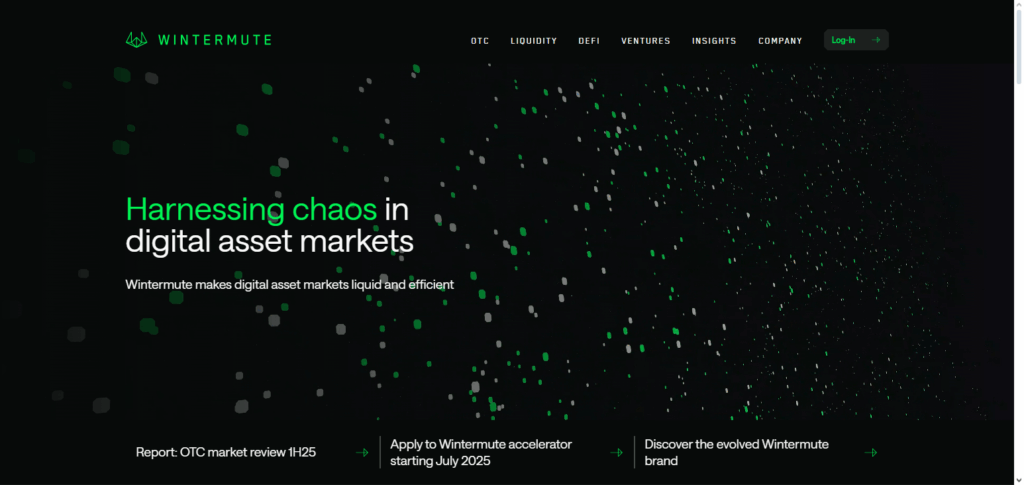
Wintermute has more than 60 trading integrations, permitting seamless liquidity and liquidity with transparent reports. Wintermute has extensive DeFi knowledge and is renowned by tokenizing, DAOs, and large financial institutions.
Wintermute is recognized and regarded as having one of the best OTC desks due to its unique ability to combine and resolve the problems of both centralized and decentralized liquidity with respect to stablecoins.
Wintermute Pros & Cons
Pros:
- Top market maker, especially in DeFi.
- NODE OTC with over 250 assets.
- 60+ trading venues.
- Efficient and flexible liquidity with transparent reporting.
Cons:
- Dependence on algorithms.
- Tend to favor institutions over retail.
- Risk in DeFi and smart contracts.
- Trading venues may result in varying settlement times.
6. Amber Group
Amber is a releases liquidity worldwide with a volume of $5bn+ daily market making and a market spread of 200+ tokens, stablecoins inclusive. OTC desks operate with 95% uptime and narrowing differentials, making it a trustworthy associate to most financial institutions.

Amber has opted to combine her financial market advisory, investment, and liquidity provision to become a fully integrated crypto financial company.
Amber Group is largely regarded as one of the best OTC stablecoin liquidity providers due to her influence and considerable presence in Asia and the remaining World, especially corporates and hedge funds within the developing region.
Amber Group Pros & Cons
Pros:
- Global liquidity provider with over $5B in daily trading volume.
- Strong coverage in Asia and other developing countries.
- Maintains a reliable system and offers fast execution.
- Provides advisory and investment in addition to OTC.
Cons:
- Facing regulations in a number of countries.
- Can be too focused on large corporations and hedge funds.
- Lack of specialization means competitor niche desks may have lower fees.
- Smaller clients may be confused by the products offered.
7 DWF Labs
DWF Labs, through its OTC platform, Liquid Markets, is committed to trading altcoins and stablecoins with the appropriate level of institutional provision. Funds under Fireblocks and Talos permits efficient wallet management as well as secure and automated trading.
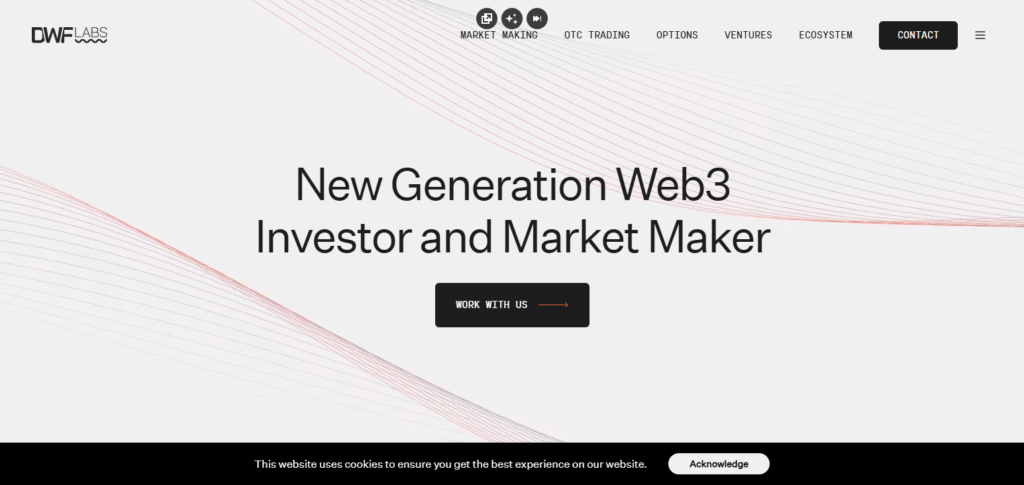
In 2025, DWF launched the USD1 stablecoin, which is fully backed by US treasuries and custodied by BitGo, offering more liquidity to the OTC market in contrast to previous offerings. DWF has increased its OTC liquidity offer.
Due to instant RFQ-based settlement and deep liquidity, DWF Labs is one of the top OTC providers for stablecoins with over 1,000 trading partners around the globe.
DWF Labs Pros & Cons
Pros:
- Wallet management services at the institutional-class over-the-counter (OTC) desk.
- Infrastructure powered by Talos and Fireblocks.
- Supports altcoin and stablecoin RFQs at instant settlement.
- Recently launched USD1 stablecoin with US treasuries.
Cons:
- Compared to most older OTC desks, DWF Labs is relatively new.
- Still establishing its market presence.
- Dependent on custodian partners.
- Compared to larger firms in the industry, global coverage may be lacking.
8. Jump Trading
Jump Trading is a quantitative trading company with a worldwide presence, and substantial involvement in the crypto markets. Jump’s research-driven strategies and advanced infrastructure allows Jump to have a stable OTC liquidity in stablecoins and other digital commodities.

Jump is specially known for her proprietary ML-powered systems with rapid execution and market pricing offered to institutional players. Jump is known for her contribution to market-making and liquidity provision, and in 2025, Jump Trading was named one of the top OTC desks for stablecoin trading.
Jump Trading Pros & Cons
Pros:
- Strong global presence, advanced decentralized quantitative trading.
- Deep market liquidity in various crypto assets and stable.
- Reasonable market pricing due to use of machine learning.
Cons:
- Limited retail access due to heavy institutional focus.
- Proprietary, opaque trading systems.
- Exposure to volatility of the market.
- Lack of traded assets transparency, relative to competitors.
9. Kraken OTC
At Kraken’s institutional OTC desk, crypto users can engage in large block stablecoin trades with guaranteed pricing. They can place trades worth over $50K, with zero slippage, which is guaranteed by Kraken’s deep liquidity pool.
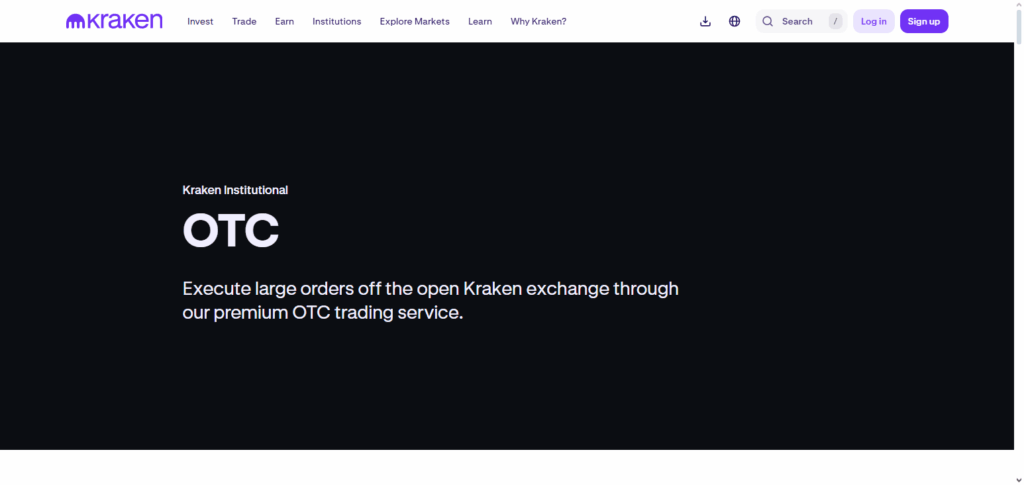
The desk offers over 150 trading pairs and allows for various settlement methods including bank, wallet, and Kraken account transfers.
With over a decade of crypto-native expertise, Kraken OTC is considered to be one of the top stablecoin liquidity providers, helping HNWIs, funds, and other organizations with efficient and safe trading.
Kraken OTC Pros & Cons
Pros:
- Compliant, registered crypto exchange is trustworthy.
- OTC desk for block trades at guaranteed prices.
- Flexible settlement for 150+ trading pairs.
- Execution is fast and secured.
Cons:
- Costs may be high compared to pure OTC desks.
- Bespoke risk management is offered very little.
- Smaller traders are likely to be excluded due to Minimum trade size ($50K+).
- Targeted almost entirely crypto-native clients.
10. Bitstamp OTC
Institutions can use RFQ-based block trading with no slippage and guaranteed execution via Bitstamp’s OTC desk. Without moving the stablecoins, institutions can access the deep liquidity through the spot markets.
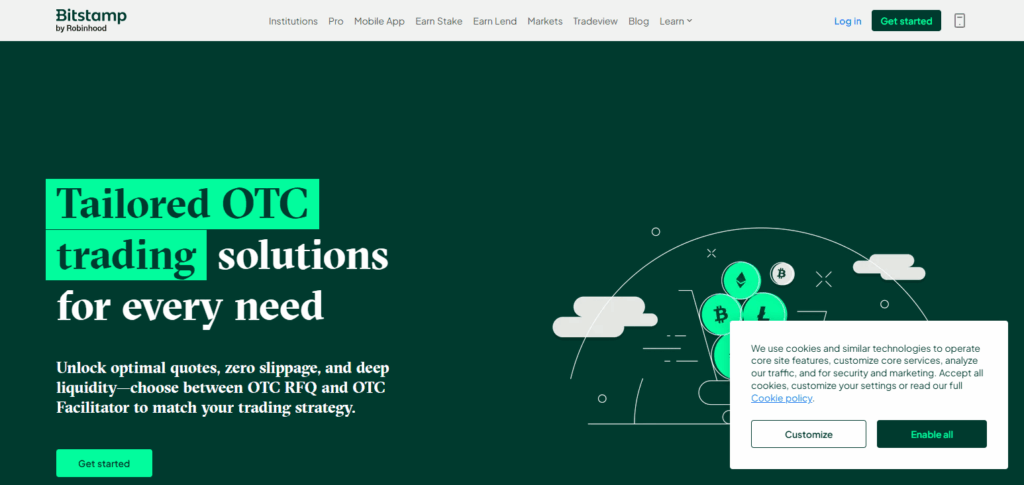
Bitstamp offers dual-path OTC solutions—RFQ and Facilitator—providing flexibility in execution strategy.
Transparent quotation and dependable settlement cycles make Bitstamp OTC one of the best OTC providers for stablecoin liquidity and this is especially true for European institutions that need regulated and client-oriented services.
Bitstamp OTC Pros & Cons
Pros:
- RFQ-based block trading with zero slippage.
- Dual-path OTC solutions (RFQ and Facilitator).
- Transparent quotes and reliable settlement.
- Strong reputation in European markets.
Cons:
- Primarily focused on EU institutions.
- Smaller global footprint compared to peers.
- May lack advanced derivatives or lending services.
- Minimum trade sizes exclude retail clients.
Conclusion
Cumberland, GSR Markets, B2C2, Galaxy Digital,, Wintermute, Amber Group, DWF Labs, Jump Trading, Kraken OTC, and Bitstamp OTC are the top liquidity providers in the OTC market and are the foundation of crypto trading in the year 2025.
They provide significant liquidity and consistent settlements in the major stablecoins—USDT, USDC, and EURS. Each provider has something unique to bring to the table; for example, Cumberland has a legacy trust and Wintermute has expertise in DeFi while Kraken has regulated infrastructure. They make stablecoin liquidity the most trusted today.
FAQ
What are stablecoin liquidity providers (OTC)?
Stablecoin liquidity providers in the OTC (Over-the-Counter) market are firms that facilitate large block trades of stablecoins like USDT, USDC, and EURS outside of public exchanges. They ensure deep liquidity, minimal slippage, and secure settlement for institutional clients, hedge funds, and corporates.
Who are the top OTC stablecoin liquidity providers in 2025?
The leading providers include Cumberland, GSR Markets, B2C2, Galaxy Digital Trading, Wintermute, Amber Group, DWF Labs, Jump Trading, Kraken OTC, and Bitstamp OTC. These firms dominate the market with global coverage, competitive spreads, and institutional-grade infrastructure.
Why do institutions prefer OTC desks over exchanges?
OTC desks offer privacy, guaranteed pricing, and deep liquidity for large trades that could otherwise move exchange markets. They also provide custom settlement options (bank transfers, custodial wallets, crypto rails) and tailored risk management tools.
Which provider is best for DeFi-native institutions?
Wintermute stands out for its algorithmic market-making and DeFi integrations, offering scalable liquidity across centralized and decentralized venues. It is trusted by DAOs, token issuers, and institutional investors seeking on-chain transparency.
Which OTC desk is strongest in Asia and emerging markets?
Amber Group is a leader in Asia, with strong coverage of USDT/USDC liquidity and advisory services for corporates and hedge funds. It is widely recognized as a go-to OTC provider in emerging markets.









